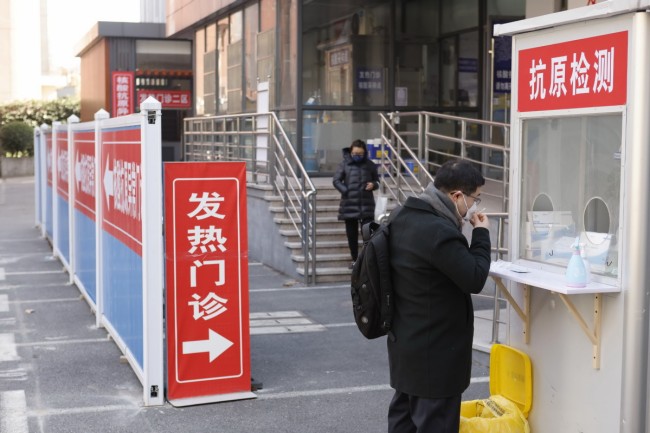Shanghai opens 2,600 fever clinics among communities

A patient takes a COVID-19 antigen test in front of a fever clinic in Shanghai, Dec 15, 2022. [Photo/ThePaper]
Shanghai began to utilize up to 2,600 community-level fever clinics starting today to tackle the swelling demands for medical treatments in the city's upgraded efforts to respond to the COVID-19 pandemic.
In those clinics, fever patients are able to receive basic treatment and health guidance as well as a 24-hour hotline for medical consultation. According to a notice released today by the municipal government, experienced medical staffs have been assigned to these clinics to treat patients and connect with hospitals. Preferential medicine supplies related to fever treatments will be given to these clinics in the communities.
Shanghai has continued to fine-tune its COVID-19 response measures after China released a set of 10 optimised COVID-19 rules, including allowing asymptomatic cases and patients with mild symptoms to isolate at home and restricting the need for mass testing, on Dec 7. On Saturday, the National Health Commission introduced a batch of new measures nationwide on how Shanghai optimised its medical services amid the new waves of COVID-19 infections.
Those measures highlight a campaign to raise the capacity of self-management among Shanghai residents in face of the pandemic; online digital medical services and abundant medicine stocks among medical institutions of different levels.
"I feel that the public has shifted the mindset within a short time", Yang Xiaoyun, a community medical worker told local news portal Shanghai Observer. "Facing the infections caused by the Omicron variant, the majority of patients displayed a sense of calmness."
The clinic where Yang works locates in Xinhong community in Minhang district. She was seen by five patients on the first day when the clinic started to treat fever patients on December 12. Before that, fever patients had to go to designated hospitals for treatments.
"All of them just have mild flu-like symptoms," she said. "During the treatment, I did not emphasise on whether they are infected or not to ease their mental pressures."
Yang said she is optimistic about where this pandemic goes in the city.
"We are on a turning point in the coming months – on one hand, there are more uncertainties after the optimisation of virus prevention measures, on the other hand, the public is truly returning to normal life."
 Contact Us
Contact Us

 Brilliant light show to illuminate Huangpu River
Brilliant light show to illuminate Huangpu River Maple leaves paint splendid scenery in Pudong
Maple leaves paint splendid scenery in Pudong Appreciate alluring lotus blossoms in Pudong's Century Park
Appreciate alluring lotus blossoms in Pudong's Century Park New pedestrian street boosts Pudong's night economy
New pedestrian street boosts Pudong's night economy 


